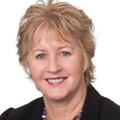Corboy’s tips for success at the WIS scholarships lunch
(Anne-Marie Corboy)
If there’s one thing that women – and probably men – can learn from Anne-Marie Corboy’s career in super and elsewhere it is: “give it a go”. She told the annual Women In Super (WIS) lunch in Sydney last week not to automatically take the safe option: “You need failures to understand success”.
Apart from joining various industry boards while she was the chief executive of HESTA, between 1998 and 2015, Corboy has also been a director of the MCG Trust and Peter MacCallum Cancer Centre and remains on the board of Netball Australia. Industry boards included Industry Super Australia, ACSI, Victorian Super Board, AIST, CMSF, Mothers Day Classic and the Superannuation Complaints Tribunal Advisory Council.
A big turnout of about 170 WIS members and guests heard from the recently retired Corboy that society tended to measure leadership “through a male prism”. One of the reasons she was active in the governance of sports administration was that female sports tended to be underfunded and under-reported in the media.
Among boards in general, she said, there was the important issue of “unconscious bias”. For example, male directors were often unaware in board or management meetings that they ignored or didn’t acknowledge comments, input or statements made by women directors and executives. This included the questions that men tended to ask and what they tended to ignore.
At HESTA, Corboy introduced training to recognise this unconscious bias. About 80 per cent of the $30 billion HESTA’s 800,000 members, mainly in the health care sector, are women.
Her three main tips for women in the industry were:
> don’t keep doing the same thing and expect a different result
> learn from others, and
> don’t just take the safe option – you need failures to understand success.
Asked about “ageism”, she said that this was also an issue, alongside unconscious bias because women between 55-75 found it difficult to pick up board seats. She believed that older male directors favoured younger women.
Asked what she felt was the most important issue for women working in super, she said: “the equitable distribution of tax concessions”. Her suggestions were to maintain the low-income co-contribution by the Government, to get rid of the $450 (per month) threshold for the payment of the SG (which discriminates against part-time workers) and to have super paid on paid parental leave.
Asked whether she considered herself a feminist, Corboy said: “Yes. Most women are feminists but some approach feminism too radically.”
As an aside, Corboy said that when she started her career as a teacher in Victoria, before getting involved with unions, she had a choice of two super funds: the former State Super Fund and the Married Women’s Fund.
The WIS scholarship winners were announced at the lunch. The number was increased from the intended two to four because of the quality of the candidates, according to the AGSM at the University of New South Wales. The winners get to attend a short AGSM course on leadership, communications or negotiations.
The winners were: Alexandra McGuigan, business development manager, Shed Enterprises; Victoria Rati, portfolio manager, international and emerging market equities, State Super; 
Heather Gyton Carroll, head of marketing, Perpetual Investments; and, 
Melinda McMullan, employer partnership manager, UniSuper.

McGuigan (pictured, in orange jacket, with the winners) said WIS asked how the applicants’ chosen course, in her case “learning effective negotiation skills”, would assist them personally, professionally and for the industry. “This course was clearly the most interesting to me as it is where I have the least experience, yet it has the greatest possibility to improve my performance personally, professionally and for the industry,” she said.
Frank Kennedy, director of AGSM Executive Education, said: “Executive-level training for these WIS members will enhance their business acumen and allow them to thrive in leadership roles, as well as broaden their personal and professional networks through the AGSM community.”
– John Hamer










